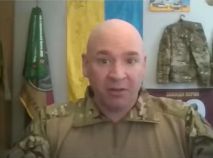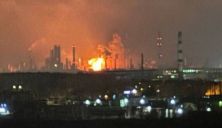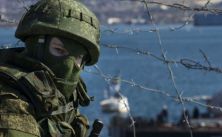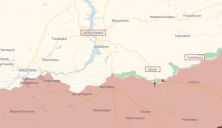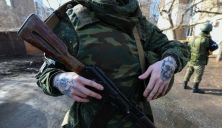Interview with Peter Dickinson on what is happening on the fronts of the world conflicts with proxy participation of the Russia-Iran and NATO blocks. Hear it for yourself.
— I’d like to ask you about the Syrian front and why the rebel attack is usually called an attack on Russia or the Assad regime, which is backed by Russian and Iranian forces. How does this proxy war affect the balance of power between these big players?
— Well, I think what we’re seeing in Syria now is a symptom of a wider geopolitical shift. The Iranians, in particular, are very overstretched now; their proxy forces in Lebanon, Hezbollah, have been devastated of late. Iran itself has taken some very serious blows from the Israelis and has been exposed domestically.
So, I think Iran is in a very weakened position and is in no state to intervene on behalf of the Assad regime. Now, the same may be true for Russia. Certainly, Russia is very heavily committed militarily to its invasion of Ukraine. Putin has sent the vast majority of his military assets, his army, his troops, and aviation to Ukraine, using them to pursue his goals there. Therefore, he’s also less able to offer the Assad regime the support it needs to quell this rebellion. What we’re seeing now is an opportunistic strike by rebel forces in Syria.
They understand that now they have an opportunity to attack Assad, that Assad is essentially propped up by his foreign supporters, and he has very little power or strength of his own. So, with both Iran and Russia heavily committed elsewhere and weakened, this is a very dangerous moment for Assad, and the rebel forces are looking to capitalize. As we can see from the progress they’ve made in the past week, it’s clear that they’ve timed their attack perfectly, with several factions advancing against Assad at the same time. These include US-supported Kurdish forces and different factions backed by Turkey.
— Can we say, in this situation, that NATO, in the face of these forces backed by Turkey and the United States, is taking over in the Syrian war?
— No, I think that would be a very wild exaggeration. I don’t think the West is as directly involved as that would imply. Certainly, Syria has long been a geopolitical chessboard, and all the major powers there have had an influence. I’m sure they’re involved in what we’re seeing now, but fundamentally, what we’re seeing here is the Syrian opposition forces taking advantage of very fortuitous geopolitical circumstances — again, the weakening of Russia and Iran. They are now seizing that moment and receiving some support from their international backers, but I wouldn’t compare this to a direct Western involvement. These parties are offering support at most, and it’s certainly not a major theater for them.
— And just for our viewers, I’d like to remind that in the Middle East, sometimes religious denomination means far more than nationality. Iran is Shia Muslim, the Assad regime is Alawite, and the rebels are Sunni Muslims, which are the majority worldwide. I believe Turkey is also of the Sunni denomination. So, we have here a religious clash inside Syria itself, right?
— Well, religion has always played a role in the uprising, but essentially it is an uprising against the rule of Assad and the government that he has installed. Opposition is driven primarily by the brutality of his regime, the way the Syrian war began as a popular uprising against Assad’s government.
The regime responded to political protests with a very harsh crackdown, which escalated into military conflict. This led to different factions emerging in a complex picture involving tribal, ethnic, and religious divides. So, it’s an extremely complex situation. But if we want to make sense of what’s happening now, the key factor is the weakening of Russia and Iran, and the fact that they are not in a position to prop up Assad as they have for the last seven or eight years. That’s why we’re seeing a dynamic on the battlefield that has been absent since Russia’s intervention began in 2015.
— Talking about the political losses of Russia, it reminds me of the Euromaidan in Georgia, similar to the Euromaidan in Ukraine in 2014. In protest against the government that decided to stay close to Russia, how do you see this?
— Well, the parallels with Ukraine’s revolutions are obvious — both Ukraine’s post-Soviet revolutions, the 2014 Euromaidan Revolution and the 2004 Orange Revolution.
The causes are similar, and we see the classic Russian model of the Kremlin overplaying its hand, being overly assertive, and trying to push a population toward rejection of integration with the West. Putin has overplayed his hand in this regard and provoked a violent response.
In Georgia, we’re seeing something similar, where Russia’s proxies tried to introduce authoritarian laws, rigged elections, and created unrest. Now we are seeing an organic response on the streets of Tbilisi, similar to what happened in Ukraine in 2014. It will be interesting to see how it plays out, and whether the Georgian people will withstand what is likely to be a tough crackdown. Sadly, I fear we will see bloodshed, and this could become a battle of wills between the Georgian people and the Kremlin-backed authorities.
— The memories of 2014 are still very fresh. I remember all the violence in Kyiv when Viktor Yanukovych adopted the “Dragon laws,” authoritarian measures, even harsher than the current laws in Georgia. In 2008, there was the Russian-Georgian War, and I really hope that the Georgian people will withstand this aggression without bloodshed.
— Well, of course, that’s the hope for everybody, but I think it’s unrealistic at this stage. We know how Russia operates — they will push their proxies in Georgia to fight, and the regime in Georgia will not back down. We saw this in Ukraine in 2014, where Russia called on Yanukovych to crush the protests. We saw a large number of people murdered in Kyiv, and a violent crackdown by the Ukrainian government backed by the Kremlin. It’s very unlikely that the current regime in Georgia will back down either, so we will see an escalation in violence. This pattern is well established, and there’s a sense of dread that this is where it’s heading, but also a recognition that if Georgia is to remain free, it will have to face the Kremlin’s aggression.
— The last question I’d like to ask is about Olaf Scholz’s visit to Kyiv, his first since 2022, with a strange suitcase in his hand. What do you think this gesture means, and what do you think they will talk about?
— Olaf Scholz is in the middle of an election campaign now, with elections looming in early 2025. Frankly, he’s not a popular figure in Germany now; he’s widely discredited and likely to lose the election. One of the reasons he’s unpopular is his response to the Russian invasion of Ukraine.
He’s talked about transforming Germany’s geopolitics and Germany’s position, and he has achieved some significant successes in overcoming Germany’s historical pacifism and reluctance to provide weapons to European states.
But at the same time, his response has been inadequate. He’s been too cautious and reluctant to give Ukraine the capability to strike back inside Russia. He’s also opposed Ukraine’s NATO membership, and he’s been very cautious about addressing Russia, essentially legitimizing Russia’s nuclear blackmail.
This visit to Kyiv is likely a way for Scholz to show German support for Ukraine, and we’ve already heard about a significant arms package for Ukraine. Germany has been one of the leading supporters of Ukraine, but there’s a sense that Scholz is a reluctant partner in this coalition, and that is damaging for him domestically.
Public opinion in Germany shows growing support for military assistance to Ukraine, but Scholz’s reluctance undermines his leadership.
Read also: British Colonel Glenn Grant: Could UK Send Troops to Ukraine?




